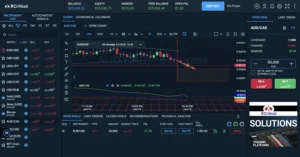When beginning their financial journey, investors often find themselves at a crossroads. The traditional stability of Forex and the revolutionary appeal of cryptocurrency trading raise the question — which is better? Among investment options, these two opportunities attract attention, each with its own unique characteristics. What makes the difference? What links them together? How do you choose the market that suits you the best? These are the questions associated with Forex vs cryptocurrency that our article will address.
What Is Forex, and What Is Crypto?
Forex trading vs crypto trading have a lot in common, yet they differ. Let’s investigate the nuances of both the decentralized realm of digital currencies and regular FX trading.


Turnkey Brokerage Solution For Your Business
Get the most profitable fully licensed fx/crypto brokerage software or ready-to-operate business in 48 hours. Best-in-class web & mobile trading platforms, sales-driven CRM, full integration with MT4/5, and 150+ payment providers.
Forex
Forex refers to an international market where investors swap foreign currencies. It engages a lot of traders who want to profit from rate fluctuations because of its volatility and high liquidity. Trading shares, precious metals, and even indices are possible here. Even though FX trading has a significant risk and necessitates expertise, many people succeed.
Almost all the world’s sought-after currencies are represented on this exchange. Here, users have a fantastic array of instruments boosting the possibility of lucrative deals.
The fundamental work of the FX market revolves around making a deal: traders have access to forecasts, analytics, and statistics that they can use to make predictions. If their predictions are accurate, they’ll get a hefty payout; if not, they will get a loss.
Pros and cons
Let’s take a look at the primary positive sides of FX:
- Market availability. Without any limitations, anyone may create a personal account and exchange currencies. Being an investor or having any specialized knowledge is optional.
- Completing quick sales. High security and speedy execution are the hallmarks of the currency exchange procedure.
- Little possibility of manipulation of trade. Since there is no centralized control over the market, no bidder can misuse insider information for its own benefit.
- High level of automation of regular procedures and adoption of unique methods. A one-time setup is required for the system to do all essential tasks automatically while accounting for current exchange rate swings.
Now, let’s list the following as the primary drawbacks:
- Because currency swings can be substantial in a short time, the loss risks are too significant.
- The advantage of large traders over small ones. Learning more information in less time gives businesses, banks, and trade organizations more opportunities to respond quickly to economic changes. Therefore, inexperienced traders constantly lose money when the rate falls.
Moreover, with limited authority, the regulator can only sometimes verify a particular broker’s integrity. Fraudsters can, therefore, roll the money several times before someone notices them and their acts.
Cryptocurrency
It’s a decentralized trading system that operates fully autonomously to sell and buy digital currency. Bitcoin, the first and most well-known coin, is established on blockchain technology, much like all other digital tokens.
Investing in and trading crypto has gained popularity among investors. Technical analysis is a crucial tactic for profitable trading. Using this method, you can understand trade numbers, evaluate data from charts, and spot potential patterns to help you make wise judgments. Trading has the potential to be both extremely rewarding and extremely risky due to the volatility and unpredictability of markets.
Success in trading mostly depends on a solid understanding of market dynamics, price chart estimation, efficient asset management, and psychological toughness.
Pros and cons
The primary advantages of crypto are:
- Decentralization. Because digital tokens work within blockchain technology, they may operate independently of banks and other financial authorities. Consequently, users now have greater flexibility and power.
- Security. Assets ensure network security and transaction protection through advanced methods. They are, therefore, a challenging target for fraudsters and hackers.
- Transferring money is easy. Using cryptocurrency makes it possible to send and receive money quickly and affordably, both domestically and internationally. It’s helpful when you want to steer clear of banks or payment systems.
- Worldwide accessibility. Anybody can use crypto, regardless of location. They remove any limitations banks or governments may set on communication with financial markets and apps.
Despite the advantages, these are the primary downsides:
- Instability. There might be big swings in the value of digital assets in a short amount of time. Crypto has two sides: it may give you gains or losses. You must get theoretical knowledge and practical experience to safeguard your funds.
- Security risk. Cybercriminals may attempt to exploit holes in the ecosystem to steal coins. Financial holdings in crypto exchange accounts are typically the target of assaults.
Yet, crypto remains one of the most profitable niches today. As an illustration, despite a boom in 2023, the market produced significant gains. The surge of 160% in BTC attracted many institutional investors. Experts estimate, by the end of 2024, it may be worth about $70.5 billion.

Similarities between Forex vs Cryptocurrency
There are similarities between Forex trading vs crypto trading, especially in several crucial areas:
- Dynamics of supply and demand: The basic ideas of supply and demand govern both markets, influencing the worth of all currencies, fiat or virtual.
- Virtual exchange platforms: FX crypto exchange acts over the internet, whether in the FX or cryptocurrency markets. People may swap multiple currencies easily with the help of several digital platforms.
- Global flexibility: Traders can conduct business from anywhere in the world. Their skill makes it possible to execute deals quickly in both markets.
- Market understanding: Success in crypto and FX requires a strong grasp of market dynamics and technical variables. Making wise and successful actions calls for a thorough understanding of these factors.
Moreover, automated online trading with bots is possible for these trading methods. With the help of such innovations, users may automate procedures and execute deals in either market in less time.
Differences between Forex vs Crypto
Nevertheless, there are some striking distinctions between Forex vs Bitcoin. Let’s dwell on the most noteworthy ones.
Intermediaries
There are brokers on FX and you can only trade profitably through them. The first step is to find a suitable service provider with acceptable conditions, commission, etc. On the other hand, a crypto trader works with virtual coins independently.
Structure
Supply and demand dynamics play a significant role in the Forex vs crypto markets. It allows clients to set prices without state interference. Traders deal in FX and virtual tokens over-the-counter (OTC) or via brokerages and exchanges. Unlike fiat currencies swapped on FX, tokens are only found online and kept on blockchains. Crypto deals only happen via digital wallets and are validated through mining procedures.
Volatility
Both markets are unstable, although the volatility of cryptocurrency is frequently higher than that of FX pairs. Because of their extreme sensitivity to even little changes in the market, virtual tokens can see significant swings in value in a single trading session. Conversely, FX has higher daily transaction volumes and is famous for its rapid moves within smaller ranges.
Money flow
FX is often more liquid because of the significant trading volume and the participation of significant financial institutions. In crypto, various tokens have varied levels of liquidity, with large ones like BTC having comparatively high levels.
Market regulation
FX and cryptocurrency regulation in the financial markets is different. Global rules covering the FX market are rather thorough. Regulatory authorities supervise the industry to guarantee that brokers operate correctly. Although country-specific restrictions differ, big financial hubs often impose stringent controls. Conversely, the regulatory environment around crypto is somewhat less demanding and varies significantly among countries. While some actively support digital coins, others place limitations on their usage.
Availability
Conventional FX trading uses go-betweens like brokers and banks. Both individual and institutional traders can access it. Conversely, crypto provides people with greater direct accessibility. With many exchanges, customers may trade directly with no middlemen.
Forex vs Cryptos Summed up
To cap it all, Forex trading vs crypto trading provides advantages and disadvantages. A trader must possess a specific level of knowledge and awareness to access their chosen trading environment, which varies depending on the trader. High-risk, high-reward crypto necessitates a thorough grasp of blockchain technology and the market. However, currency trading, which necessitates a comprehension of international politics and economics, is a more reliable and predictable choice.
When we compare Forex vs stocks vs crypto, FX involves trading global currencies, stocks involve ownership in particular ventures, and crypto refers to digital currencies like Bitcoin. Each has unique risk and reward profiles impacted by economic indicators, company performance, and technological developments, respectively.
If you want to start your own business, XCritical crypto exchange is your go-to choice. In only 48 hours, you may quickly build your complete cryptocurrency exchange. The service includes everything — from purchasing, trading, and exchanging tokens easier to guaranteeing safe client fund storage and implementing effective data protection measures. Opt for the XCritical and start your own story in the crypto realm.






